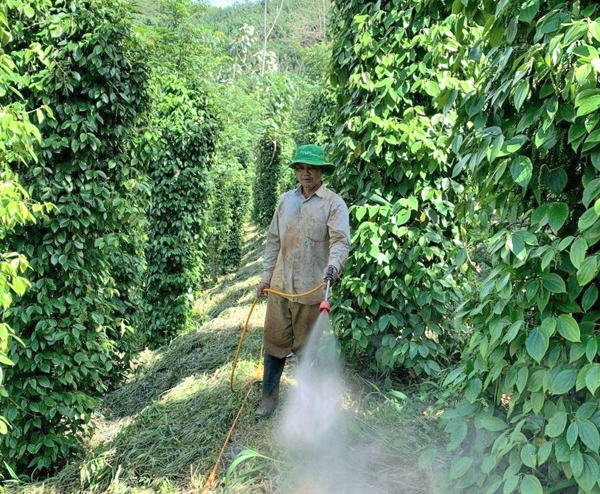| Parameter | MRL (ppm) | MRL Type | Residue Note |
| Broflanilide | 0.01 | General | Broflanilide: Tolerances are established for residues of broflanilide, including its metabolites and degradates. Compliance with the tolerance levels is to be determined by measuring only broflanilide, 3-(benzoylmethylamino)-N-[2-bromo-4-[1,2,2,2-tetrafluoro-1-(trifluoromethyl)ethyl]-6-(trifluoromethyl)phenyl]-2-fluorobenzamide, in or on the commodity. |
| Carfentrazone-ethyl | 2 | General | Carfentrazone-ethyl: Tolerances are established for residues of the herbicide carfentrazone-ethyl, including its metabolites and degradates. Compliance with the tolerance levels is to be determined by measuring only the sum of carfentrazone-ethyl (ethyl-alpha-2-dichloro-5-[-4-(difluoromethyl)-4,5-dihydro-3-methyl-5-oxo-1 H-1,2,4-triazol-1-yl]-4-fluorobenzenepropanoate) and its metabolite carfentrazone-chloropropionic acid (alpha, 2-dichloro-5-[-4-difluoromethyl)-4,5-dihydro-3-methyl-5-oxo-1 H-1,2,4-triazol-1-yl]-4-fluorobenzenepropanoic acid), calculated as the stoichiometric equivalent of carfentrazone-ethyl. |
| Chlorantraniliprole | 90 | General | Chlorantraniliprole: Tolerances are established for residues of the insecticide chlorantraniliprole, including its metabolites and degradates. Compliance with the tolerance levels is to be determined by measuring only chlorantraniliprole, 3-bromo-N-[4-chloro-2-methyl-6-[(methylamino)carbonyl]phenyl]-1-(3-chloro-2-pyridinyl)-1H-pyrazole-5-carboxamide. |
| Cypermethrin | 0.5 | General | Cypermethrin: Tolerances are established for residues of the insecticide cypermethrin (±)alpha cyano-(3-phenoxyphenyl)methyl(±)cis,trans-3(2,2-dichloroethenyl-2,2-dimethylcyclopropanecarboxylate. |
| Cypermethrin | 0.5 | General | Cypermethrin: Tolerances are established for residues of the insecticide cypermethrin (±)alpha cyano-(3-phenoxyphenyl)methyl(±)cis,trans-3(2,2-dichloroethenyl-2,2-dimethylcyclopropanecarboxylate. |
| Cyromazine | 0.6 | US Indirect | Cyromazine: Compliance with the tolerance levels specified is to be determined by measuring only cyromazine, N -cyclopropyl-1,3,5-triazine-2,4,6-triamine, in or on the commodity. |
| Cyantraniliprole | 80 | General | Cyantraniliprole: Tolerances are established for the combined residues of the insecticide cyantraniliprole, 3-bromo-1-(3-chloro-2-pyridinyl)-N-[4-cyano-2-methyl-6-[((methylamino)carbonyl]phenyl]-1Hpyrazole-5-carboxamide, including its metabolites and degradates, in or on commodities. Compliance with the tolerance levels is to be determined by measuring only cyantraniliprole in or on the commodity. |
| Dichlorvos | 2 | General | Dichlorvos: Tolerances for residues of the insecticide 2,2-dichlorovinyl dimethyl phosphate. |
| Dichlorvos | 0.5 | General | Dichlorvos: Tolerances for residues of the insecticide 2,2-dichlorovinyl dimethyl phosphate. |
| Dichlorvos | 0.5 | General | Dichlorvos: Tolerances for residues of the insecticide 2,2-dichlorovinyl dimethyl phosphate. |
| Difenoconazole | 0.1 | General | Difenoconazole: Tolerances are established for residues of difenoconazole, including its metabolites and degradates. Compliance with these tolerance levels is to be determined by measuring only difenoconazole, 1-[2-[2-chloro-4-(4-chlorophenoxy)phenyl]-4-methyl-1,3-dioxolan-2-ylmethyl]-1H-1,2,4-triazole. |
| Endothall | 5 | US Indirect | Endothall: Tolerances are established for the indirect or inadvertent combined residues of the herbicide, endothall (7 -oxabicyclo[2.2.1] heptane-2,3-dicarboxylic acid) in potable water from use of its potassium, sodium, di- N , N -dimethylalkylamine, and mono- N-N , -dimethylalkylamine salts as algicides or herbicides to control aquatic plants in canals, lakes, ponds, and other potable water sources that may lead to endothall residues. |
| Ethylene chlorohydrin | 940 | General | Ethylene chlorohydrin: Tolerances are established for residues of the ethylene oxide reaction product, 2-chloroethanol, commonly referred to as ethylene chlorohydrin, when ethylene oxide is used as a postharvest fumigant in or on food commodities. |
| Ethylene oxide | 7 | General | Ethylene oxide: Tolerances are established for residues of the antimicrobial agent and insecticide ethylene oxide, when used as a postharvest fumigant in or on the food commodities. |
| Etofenprox | 5 | General | Etofenprox: Tolerance is established for residues of the insecticide etofenprox, including its metabolites and degradates, in or on the commodity. Compliance with the tolerance level specified is to be determined by measuring only etofenprox, 2-(4-ethoxyphenyl)-2-methylpropyl 3-phenoxybenzyl ether, in or on the commodity. |
| Fludioxonil | 0.02 | General | Fludioxonil: Tolerances are established for residues of the fungicide fludioxonil, including its metabolites and degradates. Compliance with the tolerance levels is to be determined by measuring only fludioxonil, 4-(2,2-difluoro-1,3-benzodioxol-4-yl)-1-H-pyrrole-3-carbonitrile). |
| Fluopyram | 70 | General | Fluopyram: Tolerances are established for residues of the fungicide Fluopyram, N-[2-[3-chloro-5-(trifluoromethyl)-2-pyridinyl]ethyl]-2-(trifluoromethyl)benzamide, including its metabolites and degradates. Compliance with the tolerance levels is to be determined by measuring only fluopyram in or on the commodity. |
| Fluoride | 70 | General | Fluoride: Tolerances are established for residues of fluoride in or on the commodities from the postharvest fumigation with sulfuryl fluoride for the control of insects. |
| Glyphosate | 7 | General | Glyphosate: Tolerances are established for residues of glyphosate, including its metabolites and degradates resulting from the application of glyphosate, the isopropylamine salt of glyphosate, the ethanolamine salt of glyphosate, the dimethylamine salt of glyphosate, the ammonium salt of glyphosate, and the potassium salt of glyphosate. Compliance with these tolerance levels is to be determined by measuring only glyphosate (N- (phosphonomethyl)glycine). |
| Metalaxyl | 0.3 | General | Metalaxyl: Tolerances are established for the combined residues of the fungicide metalaxyl [N-(2,6-dmethylphyenyl)-N-(methoxyacetyl) alanine methylester] and its metabolites containing the 2,6-dimethylaniline moiety, and N-(2-hydroxy methyl-6-methylphenyl)-N-(methoxyacetyl)-alanine methyl ester, each expressed as metalaxyl equivalents. |
| Methoxyfenozide | 4.5 | US Indirect | Methoxyfenozide: Compliance with the tolerance levels is to be determined by measuring only the sum of methoxyfenozide [3-methoxy-2-methylbenzoic acid, 2-(3,5-dimethylbenzoyl)-2-(1,1-dimethylethyl) hydrazide] and the following metabolites (all calculated as the stoichiometric equivalent of methoxyfenozide): free phenol of methoxyfenozide [3,5-dimethylbenzoic acid N-tert-butyl-N′-(3-hydroxy-2-methylbenzoyl) hydrazide], the glucose conjugate of the phenol [3,5-dimethyl benzoic acid N-tert-butyl-N′-[3 (β-D-glucopyranosyloxy)-2-methylbenzoyl]-hydrazide] and the malonylglycosyl conjugate of the phenol [3,5-dimethyl benzoic acid N-tert-butyl-N′-[3 (β-D-6-malonyl-glucopyranosyl-1-oxy)-2-methylbenzoyl]-hydrazide]. |
| Methyl bromide | 400 | General | Inorganic bromide resulting from fumigation with methyl bromide: Tolerances are established for the total residues of inorganic bromides (calculated as Br). |
| Methyl bromide | 35 | US Section 18 | Inorganic bromide resulting from fumigation with methyl bromide: Tolerances are established for the total residues of inorganic bromides (calculated as Br). |
| Oxathiapiprolin | 0.1 | US Indirect | Oxathiapiprolin: Compliance with the tolerance levels specified is to be determined by measuring only oxathiapiprolin, 1-[4-[4-[5-(2,6-difluorophenyl)-4,5-dihydro-3-isoxazolyl]-2-thiazolyl]-1-piperidinyl]-2-[5-methyl-3-(trifluoromethyl)-1H-pyrazol-1-yl]-ethanone, in or on the commodity. |
| Picarbutrazox | 0.01 | General | Picarbutrazox: Tolerances are established for residues of the fungicide picarbutrazox, including its metabolites and degradates, in or on the commodities. Compliance with the tolerance levels is to be determined by measuring only picarbutrazox (1,1-dimethylethyl N-[6-[[[(Z)-[(1-methyl-1H-tetrazol-5-yl)phenylmethylene]amino] oxy]methyl]-2-pyridinyl]carbamate in or on the commodity. |
| Propylene chlorohydrin | 1500 | General | Propylene chlorohydrin: Tolerances are established for residues of the reaction product, propylene chlorohydrin, including its metabolites and degradates. Compliance with the tolerance levels is to be determined by measuring only the sum of propylene chlorohydrin (1-chloro-2-propanol), and its isomer 2-chloro-1-propanol, calculated as the stoichiometric equivalent of propylene chlorohydrin (1-chloro-2-propanol), that results from the use of propylene oxide as a postharvest fumigant, in or on the commodity. |
| Propylene oxide | 300 | General | Propylene oxide: Tolerances are established for residues of the fumigant propylene oxide, including its metabolites and degradates. Compliance with the tolerance levels is to be determined by measuring only propylene oxide, when used as a postharvest fumigant, in or on the commodity. |
| Spinetoram | 1.7 | General | Spinetoram: Tolerances are established for residues of the insecticide spinetoram, including its metabolites and degradates. Compliance with the tolerance levels specified is to be determined by measuring only the sum of XDE-175-J: 1-H-as-indaceno[3,2-d]oxacyclododecin-7,15-dione,2-[(6deoxy-3-O-ethyl-2,4-di-O-methyl-alpha-L-mannopyranosyl)oxy]-13-[[(2R,5S,6R)-5(dimethylamino)tetrahydro-6-methyl-2H-pyran-2-yl]oxy]-9-ethyl-2,3,3a,4,5,5a,5b,6,9,10,11,12,13,14,16a,16b-hexadecahydro-14-methyl-,(2R,3aR,5aR,5bS,9S,13S,14R,16aS,16bR); XDE-175-L: 1H-as-indaceno[3,2-d]oxacyclododecin-7,15-dione,2-[(6deoxy-3-O-ethyl-2,4-di-O-methyl-alpha-L-mannopyranosyl)oxy]-13-[[(2R,5S,6R)-5(dimethylamino)tetrahydro-6-methyl-2H-pyran-2-yl]oxy]-9-ethyl-2,3,3a,5a,5b,6,9,10,11,12,13,14,16a,16b-tetradecahydro-4,14-dimethyl-,(2S,3aR,5aS,5bS,9S,13S,14R,16aS,16bS); ND-J: (2R,3aR,5aR,5bS,9S,13S,14R,16aS,16bR)-9-ethyl-14-methyl-13[[(2S,5S,6R)-6-methyl-5-(methylamino)tetrahydro-2H-pyran-2-yl]oxy]-7,15-dioxo2,3,3a,4,5,5a,5b,6,7,9,10,11,12,13,14,15,16a,16b-octadecahydro-1H-as-indaceno[3,2d]oxacyclododecin-2-yl-6-deoxy-3-O-ethyl-2,4-di-O-methyl-alpha-L-mannopyranoside; and NF-J: (2R,3S,6S)-6-([(2R,3aR,5aR,5bS,9S,13S,14R,16aS,16bR)-2-[(6-deoxy-3-O-ethyl-2,4-di-O-methyl-alpha-L-mannopyranosyl)oxy]-9-ethyl-14-methyl-7,15-dioxo-2,3,3a,4,5,5a,5b,6,7,9,10,11,12,13,14,15,16a,16b-octadecahydro-1H-as-indaceno[3,2d]oxacyclododecin-13-yl]oxy)-2-methyltetrahydro-2H-pyran-3-yl(methyl)formamide, calculated as the stoichiometric equivalent of spinetoram. |
| Spinosad | 1.7 | General | Spinosad: Tolerances are established for residues of the insecticide spinosad, including its metabolites and degradates, in or on commodities. Compliance with the tolerance levels specified is to be determined by measuring only the sum of spinosyn A (Factor A: CAS #131929-60-7; (2 R, 3a S, 5a R, 5b S, 9 S, 13 S, 14 R, 16a S, 16b R)-2-[(6-deoxy-2,3,4-tri-O-methyl-?-L-mannopyranosyl)oxy]-13-[[(2 R, 5 S, 6 R)-5-(dimethylamino)tetrahydro-6-methyl-2 H-pyran-2-yl]oxy]-9-ethyl-2,3,3a,5a,5b,6,9,10,11,12,13,14,16a,16b-tetradecahydro-14-methyl-1 H-as-indaceno[3,2-d]oxacyclododecin-7,15-dione); and Spinosyn D (Factor D; CAS #131929-63-0) or (2 S, 3a R, 5a S, 5b S, 9 S, 13 S, 14 R, 16a S, 16b S)-2-[(6-deoxy-2,3,4-tri-O-methyl-?-L-mannopyranosyl)oxy]-13-[[(2 R, 5 S, 6 R)-5-(dimethylamino)tetrahydro-6-methyl-2 H-pyran-2-yl]oxy]-9-ethyl-2,3,3a,5a,5b,6,9,10,11,12,13,14,16a,16b-tetradecahydro-4,14-dimethyl-1 H-as-indaceno[3,2-d]oxacyclododecin-7,15-dione), calculated as the stoichiometric equivalent of spinosad. |
| Sulfuryl fluoride | 0.5 | General | Sulfuryl fluoride: Tolerances are established for residues of sulfuryl fluoride in or on the commodities from the postharvest fumigation with sulfuryl fluoride for the control of insects. |
| Trifloxystrobin | 30 | General | Trifloxystrobin: Tolerances are established for residues of trifloxystrobin, including its metabolites and degradates. Compliance with tolerance levels is to be determined by measuring only the sum of trifloxystrobin, benzeneacetic acid, (E,E)-alpha-(methoxyimino)-2-[[[[1-[3-(trifluoromethyl) phenyl]ethylidene] amino]oxy]methyl]-, methyl ester, and the free form of its acid metabolite CGA–321113, (E,E)-methoxyimino-[2-[1-(3-trifluoromethyl-phenyl)-ethylideneaminooxymethyl]-phenyl]acetic acid, calculated as the stoichiometric equivalent of trifloxystrobin, in or on the commodity. |





